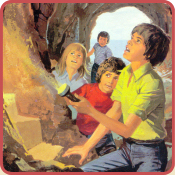
Fun With the Twins (Little Book No. 16)

Book Details...
First edition: 1954
Publisher: Brockhampton Press
Illustrator: Eileen A. Soper
Category: Brockhampton Little Books
Genre: Family
Type: Short Story Series Books
Publisher: Brockhampton Press
Illustrator: Eileen A. Soper
Category: Brockhampton Little Books
Genre: Family
Type: Short Story Series Books
On This Page...
- An Afternoon at Granny's
Story: Specially Written - "Hey, There!"
Story: Specially Written - Well Really, Old Grandad!
Story: Specially Written

The twins are visiting Granny's place, and when the lady feels like an afternoon nap she instructs them both to go outside and play nicely together. After promising not to make a noise Johnny and Jinny enter the garden to play ball in a way that many of us did way back in the old days - they decide to throw it back and forth over the roof. Granny's cottage is not very high so it looks as if they should be able to get the ball over all right.
Johnny at the front, and Jinny at the back. Johnny chucks the ball but it hits the roof, bouncing down the tiles and back over the edge. The boy tiptoes to the sitting-room window just to see if the noise has disturbed Granny, but it hasn't. She's fast asleep in her chair. He chucks the ball again and this time it sails right over the roof and falls to the ground where Jinny is patiently waiting. She catches it on the second bounce and, aiming carefully, throws it with all her might ... but, as Enid Blyton might remark, 'she's only a girl' ... and the ball bounces back down to her. Second try. Third try, but it's no good, she just can't manage to send it right over the roof and Johnny, losing his patience, comes round and echoes what any Blyton boy character may well have said,
"Just like a girl - can't even throw!"
Stung by this remark, Jinny hurls the ball as hard as she can and up it goes. Has it gone right over? Well, it hasn't bounced back again so perhaps it did, and has now fallen into the front garden. They walk round the house and start searching everywhere, even out in the road, but it looks as if the ball has completely disappeared. Jinny is cross because it belonged to her and she starts berating Johnny for suggesting such an idea although he reminds her that she wanted to play just as much as he did. The afternoon passes with Johnny and Jinny not talking or playing with each other and they're rather relieved when tea-time arrives. The reader can try figuring out where the ball might have gone and as grown-ups are cleverer at working things out than children, my bet is that it went down the chimney.
Maybe it didn't, but where else could it go?
Hey There!
This tale concerns the twins' involvement with a boy called Tommy who misrepresents their good intentions. Johnny and Jinny are coming home from school and see a lad in front of them carrying something in a basket. Jinny notices that a white powder-like substance is trickling out and falling to the ground so they start running after the boy because he might be losing some flour or sugar from a pierced container.
'Hey there! STOP!" Johnny yells but the boy, seeing the twins chasing after him, takes fright and bolts. Faster and faster he runs, down the lane, up a pathway to the top, and through the gate of a house where he pants out his plight,
"They chased me mummy! They tried to catch me!"
The boy's mother turns to the twins who have just reached the gate and starts telling them off in no uncertain terms but Johnny interrupts her flow to pass on what he and his sister had observed. The woman understands and alters her stance although the little boy is still peeved over his frightening experience. No buns can be made for tea now because the twins' summation was correct - a burst bag of sugar had been the cause of it all and, naturally, you need sugar to whip up a decent set of buns.
The twins then prove how good and kind they really are ... excellent examples of the way children in Enid Blyton stories are expected to act.
Well Really, Old Grandad
In Blytonland it's common for rural families to get their dairy products from a nearby farm rather than visiting the corner store so one day when the twins call into the Straws' homestead for a dozen eggs, the farmer's wife invites them into her big smelly kitchen ('smelly' in the sense of apple puddings and sausage rolls) telling them to wait whilst she fetches some eggs from the hen-house. No sooner has she left, than a voice comes from the next room where Mrs. Straws' grandfather is resting. The twins think they'd better see what he wants, so they enter and confront a big red-faced, whiskered chap sitting in an armchair. He asks where Mrs. Straws is and the twins tell him, whereby the old man asks if they could locate his spectacles. Like many elderly people he suffers from memory lapses ... his glasses have disappeared, and yesterday he lost his pencil, and his knife went last week. He can't get up to look for them because of his bad leg.
Well of course that's a challenge for the children but after hunting around for a while they can't find anything at all let alone Grandad's glasses. The man becomes a little reproachful, muttering something about " ... children these days..." He even tells them that if it were possible for him to get out of the chair he'd find them in a trice. The twins have become quite hot and untidy with all their searching so Grandad tells them to wait until Mrs. Straws returns.
"She'll find them," he says very confidentially even though he'd mentioned to the twins only a few minutes previously that she can never find his lost things. Johnny and Jinny stand there, wondering where the items might have disappeared and Jinny suggests they may have become caught in the rug over the man's knees, but 'No,' because Grandad's already shaken it out and even felt round the seat underneath.
He hasn't lost only his glasses and pencil and knife, but there are at least eight or so other things that have vanished and it takes a brainwave on Johnny's part to hit on exactly where Grandad's possessions have ended up. I think it's a safe bet to assume that all of us, at one time or another, have experienced a loss in in exactly the same way so it might be a good idea to do exactly what the twins did.
You never know what's waiting to be discovered.
#1: On P.5, the ball used by Jinny and Johnny resembles a small balloon.
#2: The Merry and Friendly Story Books feature women very similar to the little boy's mother meaning that Soper, like other artists, has her own particular way of portraying characters. I wonder if she ever drew a woman with long hair.
The cover picture is from tale No.2.
#3: 'Straw' is a very common surname for EB farmers although, in this case, it's Straws.
Mrs. Straws' first name is 'Annie.'
'Grandad' is spelt as such in the story, whereas 'granddaughter' has the double 'd.'
Many of Eileen Soper's elderly men look quite ancient.
All the pictures are good (as if they'd be otherwise) but the one on P. 9 might be a little gooder because it's one of those illustrations where the characters' attention is marked. Actually there are no page numbers, so the image is of Granny watching the twins hunting for something.








